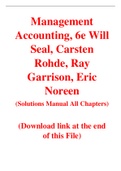Exam (elaborations)
Management Accounting 6th Edition By Will Seal, Carsten Rohde, Ray Garrison, Eric Noreen (Solution Manaual)
- Course
- Institution
Management Accounting, 6e Will Seal, Carsten Rohde, Ray Garrison, Eric Noreen (Solution Manaual) Management Accounting, 6e Will Seal, Carsten Rohde, Ray Garrison, Eric Noreen (Solution Manaual)
[Show more]



